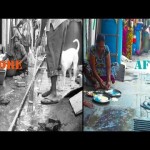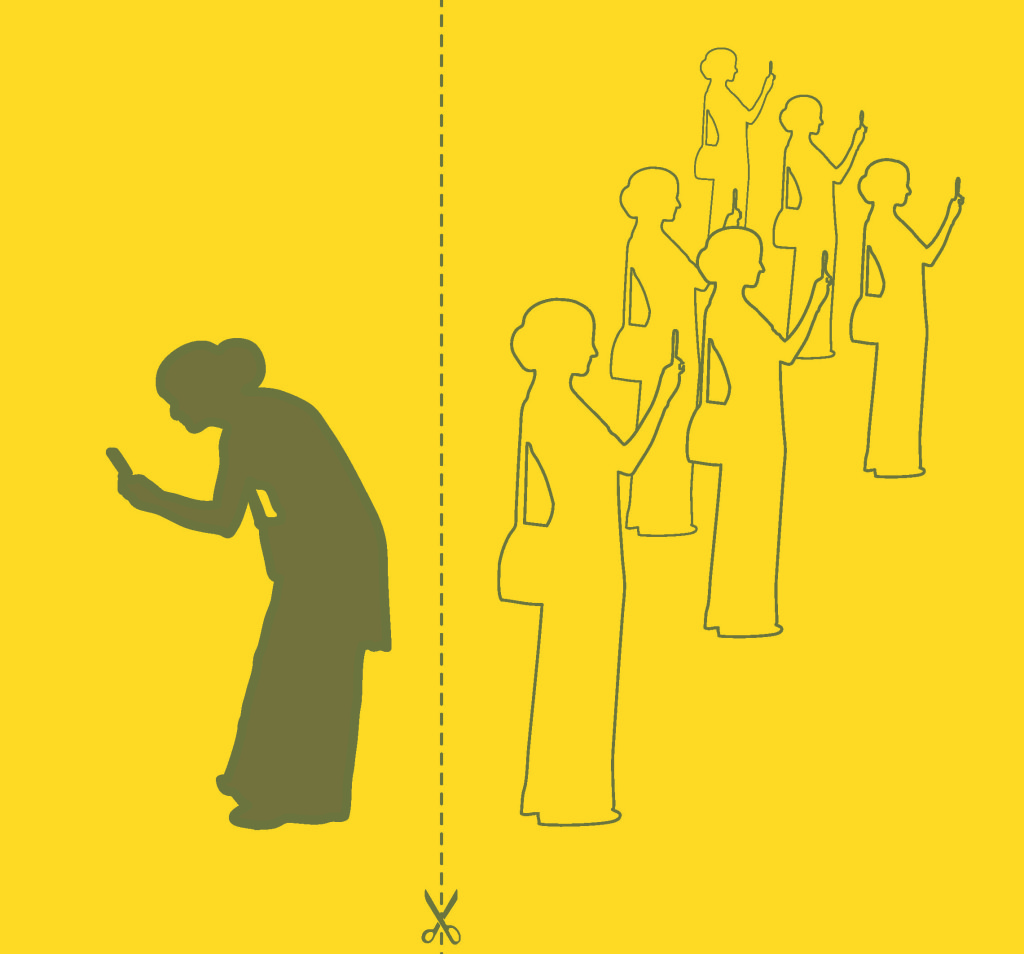In a tiny village in India’s northeast Jharkhand province, some 250 people gathered in an open area for an unusual treat: a video. Unusual, because it wasn’t some Bollywood glitz completely alien to their reality; they were watching a homemade movie about their own community, starring some of the people present in the audience. The subject? The Jindal Power Plant’s forced evictions of local residents. The company had been trying to acquire the land for years and, patience waning, they were beginning to simply grab it. Suddenly, agents from the company stormed the screening, causing a huge uproar. The police were called but refused to stop the screening.
[caption id="attachment_11993" align="alignleft" width="150"]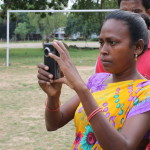 Mary Nisha Hansda[/caption]
Mary Nisha Hansda[/caption]
“For a change, it was the agents of the company who returned empty handed. Not only the distressed communities but we as correspondents have received a voice and renewed courage to bring positive change,” says Mary Nisha Hansda who is a Community Correspondent from Godda District and a founding member of the local HasaBhasa movement fighting imminent land acquisition by the Jindal group in the area.
Hansda works in the community to make people aware of their legal rights before and during evictions. She tells them about Free Prior and Informed Consent, about compensation processes, etc. That evening, Mary was screening VV’s informational video on the subject. “We are not against progress. But progress which doesn’t kill our identity; which doesn’t take away the land to which this tribal identity is tied. The local media in my region are in favour of the companies. It is only through networking with other organisations that we have ensured that journalists from Ranchi and Kolkata come and document our voice. Otherwise, the voice of the villagers never carries beyond the village,” says Hansda explaining her desire to be a part of the Community Correspondent network.
Mary is one of more than 50 women and men trained by Video Volunteers to report on Jharkhand’s realities. Community Correspondents record issues ranging from the effect of mining and forced evictions on tribal communities to the breakdown of administration at a village level to grossly inadequate medical, educational, infrastructure facilities that their communities live with.
The motley crew of Community Correspondents includes farmers, teachers, health workers, activists trying to save the last few remaining jungles of the area, housewives and social workers among others. Not people you would associate with reporting as many of us know it. Rather than being disinterested observers of events, these reporters are engaged in changing what they see around them. They fill the gaps created by major Hindi and English newspapers and TV channels that give only 0-7% space to rural news.
Reporting that brings justice for children and women
Getting more female voices in the news is a global challenge. In the U.S., a women’s group found that only 20% of op-eds written in America are authored by women. Globally, women only report about a third of the news stories in print media, according to Global Media Monitoring Project’s 2010 report. Therefore it was a conscious decision to recruit as many women as possible in the network to balance this skewed sex ratio and so in 2013 and 2014 we recruited only women CC’s in Jharkhand. Their reporting often sees things from a nuanced gendered lens—even issues like the non-implementation of social security schemes and forced evictions. The women feel that working as correspondents has given a boost to their self-confidence and a greater skill set to bring social change in the areas they work in.
[caption id="attachment_11995" align="alignleft" width="150"]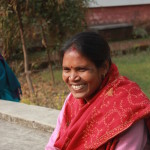 Nirmala Ekka[/caption]
Nirmala Ekka[/caption]
Correspondent Nirmala Ekka joined VV with the single-minded goal of documenting how rapid urbanisation has thrown up a whole new set of challenges for women, making them vulnerable to trafficking and sexual violence. She explains the transformation she sees in her own self, “I understand the local issues much better than I previously did. I now have a working knowledge of English. I attribute all of this to the exposure Video Volunteers has given me, whether it is mentoring newer Correspondents or going and training other people to use video as an advocacy tool, like I did recently in West Bengal. I feel empowered enough to go to the police station and Block Office to make further enquiries about the issues we face.”
In the past three years she has been covering stories in the urban slums of Ranchi, the capital of Jharkhand, and highlighting problems like the lack of child care facilities, sewage, and sexual assaults on children. In one particularly harrowing story Nirmala reported regarding the rape of a minor, she was successful in making sure that the family of the child got proper legal aid. Nirmala snorts with cynical laughter when she describes how the State had appointed four lawyers for the accused who has a previous record, and one single lawyer for the child’s family. She details how the court spent months postponing this case, how the sheer lack of knowledge & awareness of legal processes left the child’s family bewildered. Nirmala was one of the few who convinced the hesitant family to report the case and pursue a legal battle that was becoming an uphill task.
“Such is the state of affairs in Jharkhand, that if crimes are committed you are discouraged from initiating action because it will simply take up far too much time...When I shared my fears with friends & colleagues at Video Volunteers, everybody insisted on the same thing— to follow this case through.” As Nirmala’s video reached mainstream news, VV asked the Association for Advocacy & Legal Initiatives to take up the case and the proceedings continue to this date.
Reporting on Mining
While recruiting potential Community Correspondents we were looking for people already working on social issues in their communities. For many, their work as correspondents consolidates the other work they do as part of organisations and social movements.
With one reporter serving the needs of several communities over a long period, the resulting videos give an in-depth understanding of the socio-political dynamics playing out in the area. While some correspondents pick up one issue and collect multiple evidences of it from across their whole district, others create a detailed picture of an area by documenting many different issues in just a handful of villages.
[caption id="attachment_11996" align="alignleft" width="150"]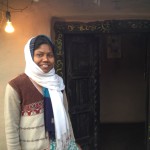 Basanti Soren[/caption]
Basanti Soren[/caption]
Basanti Soren lives a kilometre away from the East Parej Coal Mines, which have left an indelible mark on the environment and traditional livelihoods of the forest dependent community there. Basanti has been a part of the Jungle BachaoAndolanfor a few years, a movement that seeks to conserve the remaining forests of the area otherwise decimated by mining. As a video activist, Basanti has been documenting the lack of rehabilitation and compensation to those affected by the mines.
For the past decades extractive industries have been set up across Jharkhand on the premise of economic development. Who exactly the beneficiaries of this development are remains to be answered. The literacy rate remains 67.63% compared to the national rate of 74.04%; the infant mortality rate is 41 (per 1000) compared to the national 50; Only 36% villages have access to all weather roads, compared to 57% at a national level.
“My people are the ones who pay the price for this 'development'. In the past many people have filed complaints and made appeals to solve issues like dipping water tables, pollution, displacement and so on. There has hardly ever been a response to these... A large part of the problem is that we just don't know our rights. The government wont tell us, the companies wont tell us. Of course not! They are scared that if we know, we'll ask them questions. With my videos I ask those questions,” Basanti says.
[pl_video type="youtube" id="qipx_Y7m__Y"]
[pl_video type="youtube" id="67wO30TPY1s"]
[pl_video type="youtube" id="2_ALuWhThKo"]
[pl_video type="youtube" id="hgXMZnxH-Q8"]
The effect of Armed Conflict on Tribal Lives
[caption id="attachment_11994" align="alignleft" width="145"]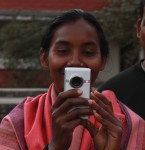 Amita Tuti[/caption]
Amita Tuti[/caption]
Amita Tuti, a Correspondent who has been with the network since 2012 has focused her camera on the effect of the Naxal conflict on tribal lives. In Khunti, where she comes from, the conflict mars the education of children, people’s livelihoods and access to government schemes. Amidst this people try to preserve their tribal rituals and customs, which provide a much-needed sense of security to them. Amita’s reports juxtapose these stark realities.
[pl_video type="youtube" id="dP7ZC5K6SMo"]
[pl_video type="youtube" id="i6HePNHt6Pw"]
[pl_video type="youtube" id="vcVEGSZ4cnE"]
[pl_video type="youtube" id="RqcQmSkfPoo"]
Reporting that creates a bridge between people and government
With a breakdown of local governance and lack of media coverage on the hyper-local issues, correspondents have highlighted their own growing realisation that a close interaction with government officials is necessary to bring change. Between 2013 and 2015 74 videos have managed to solve the issues they raised.
[caption id="attachment_11997" align="alignleft" width="150"]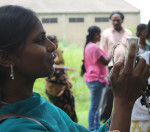 Halima Ejaj[/caption]
Halima Ejaj[/caption]
Halima Ejaz from Baghmara recently used her video to bring better maternal and child health to two villages. In one case women started receiving the cash incentives for institutional deliveries and in another case ensured that new-born children started getting their birth certificates so that they could benefit from schemes. Apart from being a Correspondent Halima has worked with the National Rural Health Mission for close to a decade as ASHA worker and now a supervisor. Having been responsible for maternal and child health in 16 villages, she lends an expertise on the issues she covers.
She says, “When I’d visit villages before being a correspondent, I couldn’t help tackle issues apart from healthcare, but now I can. We can change the fate of our communities by raising the local issues and making the administration aware of their existence. My community sees me as a change agent.”
Correspondents are seldom alone in their journey to bring change; they mobilise the entire community and prepare them to advocate for themselves. Community Correspondent Shanti Baraik helped Ichatoli, a village where no officials want to go because of its proximity to Naxal violence, get electricity for the first time in years. Shanti helped trace down the officer in-charge and contractor at the electricity department to finish the work. The residents accompanied her to officials and eventually they were the ones who hauled the poles and wires into the village to set up connections, when the contractor refused to.
Government officials have had a mixed reaction to the correspondents’ work, though most have been cooperative. “I was a bit nervous as I’d never met any Block Development Officer (BDO) before. Jay Kumar Ram, the BDO, was curious to know more about the work we were doing and was happy to chat about it. He told us to come and gather more information on such issues at any time, so that a larger number of people could benefit from the videos”, BasantiSoren recalls her first meeting with an official. The meeting resulted in 80 people getting ration at the correct price for the first time in years.
Shikha Paharin is a Correspondent from the Paharia tribe, classified as a Particularly Vulnerable Tribal Group, one which faces the challenges of a dwindling population, dealing with rapid socio-economic changes and the utter lack of facilities like education, water and healthcare.
“For a whole decade between 2004 and 2014, I had seen how my Pahariya community has lived under difficult circumstances. I want to bring back hope in their lives… , as an ordinary citizen, one cannot do much. An ordinary citizen's voice is trampled. The people of my community are simple folk. In my region, media – whether print or electronic – fails to reach the remote, hilly areas where my community lives. Even if they reach, they don't report it correctly. That's why I wanted to become a reporter.”
For communities like Shikha’s these video reports will expose the problems they have lived with to a global audience. The network has produced 397 videos from such media dark regions in 2014-15 alone. Each report has brought out a new voice, opinion or concern from Jharkhand, for the world to see and act on.
Requesting financial assistance to build sanitised toilets
The Community Correspondent Nanu Kumari is talking to the Block officials now to arrange for financial assistance to construct toilets. Hope the residents of Murha Chhataun village do not have to face trouble and discomfort in their daily lives, this is their basic civil rights.
Fixing India| Catching A Human Trafficker| Featuring Navita Devi|
Because of Navita's determination and bravery, a human trafficking agent is being the bars, and the girls have returned to their homes.This is how our CC’s are helping raise issues and finding solutions.

